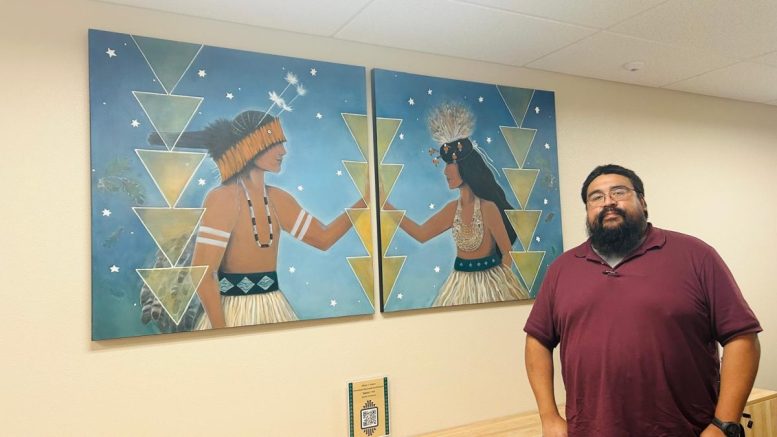College is in the process of returning its collection of Native American remains and cultural items
By Omid Manavirad
Sacramento State recently announced plans to return any Native American artifacts and cultural items found on campus, as part of the Native American Graves and Repatriation Act (NAGPRA).
A three stage campus-wide survey has been instituted to appraise all Native American remains or cultural items that may still be on campus.
President Luke Wood sent out an update asking all departments, faculty, staff and students to report any Native American items that may be on campus. He also asked anyone who encounters such items to not physically handle or move them and instead contact Senior Advisor to the President and NAGPRA Designee, Dr. Mark R. Wheeler.
The NAGPRA was instituted in 1990 by the federal government, requiring all institutions receiving federal funding to return culturally affiliated items and remains to their respective tribes. The California NAGPRA was enacted in 2001 to ensure that all state agencies and museums receiving federal funding also returned remains or cultural items.
For stage one, an online Qualtrics survey will be sent at the end of September to students, administrators and faculty, allowing the campus community to report human remains or Native American cultural objects.
This will be followed by a self-assessment survey in early October for directors, department heads, chairs, administrators and faculty to guide campus personnel while physical inspections of departments are performed.
Based on the surveys’ results, authorized campus personnel will perform a physical search of the identified areas on campus during the Fall 2024 semester.
A 2023 state auditor’s report showed that only 6% of the nearly 700,000 identified cultural items and human remains in the California State University system had been repatriated. According to the audit, Sac State had the third-largest collection in the CSU system, with over 115,000 items.
Legislators and California tribal representatives questioned CSU administrators in a hearing concerning the system’s failure to return Native remains and cultural artifacts, despite state and federal law.
Per last year’s state auditor’s report, 73% of ancestral remains and 49% of cultural artifacts in Sac State’s collection had been claimed by, but not returned to, their respective tribal nations.
Since then, Sac State has worked to register all remains and items in the Federal Registry and return all cultural objects and remains to their respective peoples.
NAGPRA Coordinator Sara Eckhardt stated in an email that over 85% of Sac State’s Native ancestral remains have been repatriated to date, 90% of which has been published to the Federal Registry. Regarding the cultural items, 60% were returned, and 73% were registered according to her email.
Eckhardt shared how the university came into possession of its inventory. According to Eckhardt’s email, most of it was collected during university-led archaeological research projects primarily from 1950 to 1990.
“The collections possessed by the University were obtained through a variety of means, many of which involved some student participation,” Eckhardt said in an email “The now-defunct Archaeological Research Center did perform some of the work on behalf of other agencies up until its closing in 2020.”
As Sac State continues to return cultural resources, the recently constructed Esak’Tima Center has become a designated space for Native American students on campus since its grand opening in 2023. Joaquin Tarango, the newly appointed advisor to President Wood for Tribal Community Relations and Native Student Success, said the work being done is important, even if it may take a while.
“It’s the small steps to get to where we want to. I think they’re doing a good job,” Tarango said “You have to take these smaller steps: working with the tribe, working with the community, working with the departments here.”
Sac State provides a list of Notices of Inventory Completion and Notices of Intent to Repatriate on the university NAGPRA webpage, as part of its legal obligation to NAGPRA.
The campus itself rests on the homelands of the indigenous people of this area: the Nisenan, the Nissim-Pawenan and the Miwok peoples. Tarango himself is of the Miwok people.
Mickey Nelson, a sophomore studying kinesiology, is part of the Karuk tribe and said that the effort to return remains is a step forward for Sac State.
“I think it’s the right step towards rebuilding forgiveness,” Nelson said. “Especially since Sac State is built on native lands, I feel like it’s a good thing to do.”
Nelson said her culture and tribe are incredibly important to her, and that she would have preferred Sac State returned their inventory years ago. She stressed that having these cultural itemshelps some native people remember their culture after enduring colonization.
“Returning the remains is a very big thing. Tribes do fasting, dancing, and ceremonies, especially after the deaths,” Nelson said. “Putting them to rest is a big part of our culture because we reflect and talk to our ancestors a lot.”
This article was originally posted on The State Hornet.


Be the first to comment on "Native American graves and repatriation survey to be conducted at Sac State University in October"